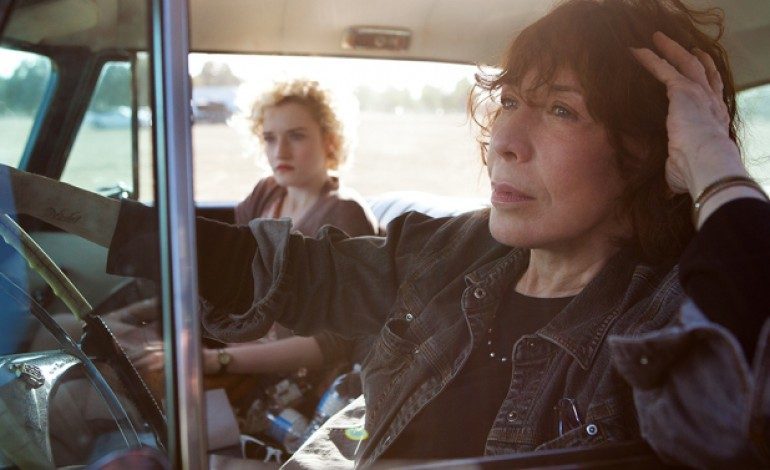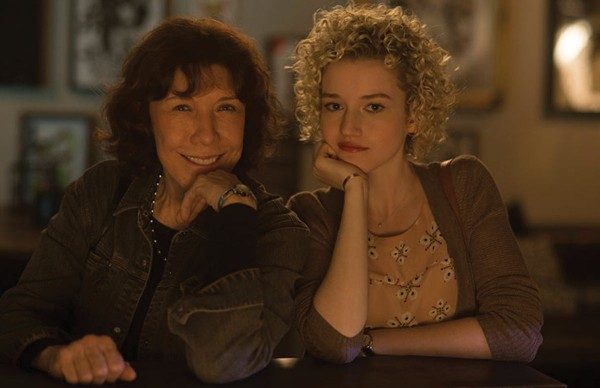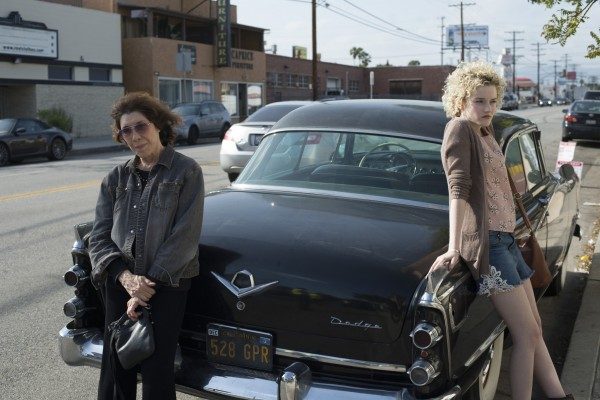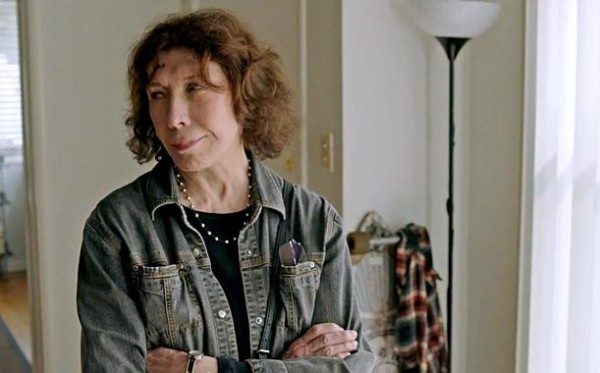

There’s only one reason to check out Grandma, yet it’s a very good one: To lay witness to Lily Tomlin’s beautifully modulated leading performance. In the film, the veteran performer portrays Elle Reid, an irascible, unapologetic woman in her seventies. While writer-director Paul Weitz (Admission, About a Boy) injects ideas and multiple characters into his deceptively simple road movie, he’s smart to never lose focus of Tomlin, allowing audiences to luxuriate in time well spent with this one-of-a-kind performer.
We first meet Elle at a particularly tense moment. As the movie opens, she’s breaking up with Olivia (Judy Greer, blessedly given a little more to do following her non-stop summer of blockbuster duty), her much younger girlfriend. Elle howls harsh, even scornful words, even calling Olivia “a footnote.” While we learn soon thereafter that the relationship between Elle and Olivia only started a few months prior, more importantly, Elle was in a 40-year love affair with a woman who died not too long ago, which makes the abruptness a bit more understandable. The thrust of the scene is jarring and rather unsettling as an opening number, but right away it squares away a few sharp details about Elle. She’s authoritative and intelligent- she earned some degree of prominence in a former life as a poet- as well as forthright and sometimes dismissively cruel. The crux of Tomlin’s performance is the way she poignantly and seemingly off-offhandedly adds dimension, scope and empathy to Elle while always maintaining her no-nonsense assertiveness.
The break-up, as it turns, was just the opening act for what would be a very long day for Elle. The movie re-starts when Sage (Julia Garner, The Perks of Being a Wallflower), Elle’s teenage granddaughter, arrives at her doorstep with a hasty request. The young woman has found herself in the family way and needs $600 for an abortion scheduled later that afternoon. The problem: Elle is temporarily tapped out (having recently cut up her credit cards and turned them to windchimes: “I’m transmogrifying my life into art”). A few contrivances on the side and the duo hit the road in a 1955 Dodge Royal (a car that personally belongs to Tomlin) to hunt down some cash.
What follows is essentially a series of vignettes as Elle and Sage search for funds. Nat Wolff (Paper Towns) shows up in a scene that more or less exists just to serve how much of a badass Elle is (we already knew that); so does a lovely Laverne Cox (Orange in the New Black) as a tattoo artist and longtime friend of Elle’s- she’s broke but does provide some free ink. Marcia Gay Harden (Pollock) also turns up as Sage’s mother, Elle’s daughter- both relationships are particularly brittle. Consistently amusing as it as, Grandma sputters a bit from time to time though, in the end, the whole is significantly greater than the sum of its parts. Sage, despite the likable performance provided by Garner, for instance, is mostly cypher. Even within the valleys though, Elle’s character becomes increasingly more complicated and involving. In the hands of Tomlin, there’s this grand sense of a life lived and despite Elle’s prickliness, beats an enormous human heart. Elle may never change and blessedly, doesn’t need redemption.
One part of the journey particularly involving is when the duo find their way at the doorstop of Karl (a wonderful Sam Elliott), an old time friend and perhaps more so to Elle. In easily the most insightful and beautifully crafted sequence in the entire movie, Elle dances around asking Karl for money while the past (both glorious and heartbreaking) comes boiling up to the surface. If there’s a fault, it’s that Weitz overwrote the sequence, flooding the time spent here with enormous tomes of backstory when all we really needed was the expressiveness of the actors to know the score. Still, the moments of Elle girlishly putting on lipstick for Karl and the two of them sharing a joint together are sublime.
Small grace notes like that make Grandma a special and more singular movie. As it’s refreshing to see a tough subject like abortion deftly handled on screen, it’s perhaps even more refreshing to see a complicated portrait of an older woman, warts and all. Elle is expressed as a woman who was on the feminist war field ages ago and is spurred on by the fight, the struggle and discussion. Early in the movie, Elle is stunned to find out that a former clinic has been retrofitted into a chic coffee shop. While this is treated as a mere aside, Tomlin invests in Elle a greater sense of history and the struggles that came with being a modern woman in a world not quite at her speed.
To say the very least, Elle fits Tomlin’s strengths as a performer to a tee. Mixing the funny with the philosophical while gently layering in pathos has long been a hallmark to Tomlin’s career and her wide-ranging collection of characters. Whether as wife and mother seduced by a folk artist womanizer in Robert Altman’s sprawling 1975 classic Nashville (for which Tomlin received an Oscar nomination), the precocious five-and-half-year old Edith Ann or Trudy the Bag Lady, the derelict who ponders the artistic ambition of Andy Warhol’s Campbell soup painting in the brilliant The Search for Intelligent Life in the Universe (penned by Tomlin’s longtime partner Jane Wagner), Tomlin has given definition and dignity and a sense of questioning and wonder to the eccentricities of the human condition. Grandma, hopefully, shows there’s still more characters to add to the canon.
Verdict: 4 out of 5
Cruising in at a brisk 78-minutes, Grandma can at times feel a bit slight and is periodically overwhelmed with unnecessary dispensing of Elle’s backstory- why overwrite when you have an ace actor to convey history with a subtle gesture or wrinkle in the face. Yet, the reason to see Grandma is to behold the wondrously prickly performance of Lily Tomlin. Funny, poignant and acidic often within the same beat, the legendary performer summons great truth, humor and pain in one of the meatiest screen roles of her career. As such, Elle is a worthy new entry in Tomlin’s well-stocked collection of characters. And that’s the truth.



